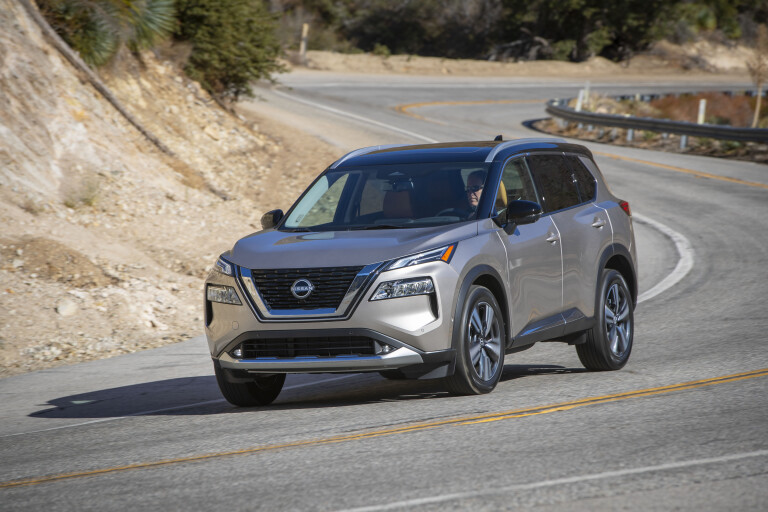
Things we like
- Interior design
- Flexible storage
- Full suite of safety tech
Not so much
- ProPilot tech needs refinement
- Auto climate control
- Exterior styling
UPDATE, Nov 2022: Australian pricing for all X-Trail petrol and e-Power models now available, e-Power driven
Australian pricing for the regular petrol 2023 X-Trail and petrol-electric 2023 X-Trail e-Power models is now available. We've also now driven the e-Power version. Get all the details at the link below.
REVIEW: 2023 Nissan X-Trail first drive
December, 2021: Despite its age, one can’t call the X-Trail long in the tooth because it’s popular with Nissan customers around the world, hauling families and delivering solid value in the medium SUV segment.
Still, this current generation has been around since 2013 and was facelifted in 2017, so by age factor alone it’s due for a redesign.
The 2021 model year marks this generation’s swansong, but the new-generation 2023 Nissan X-Trail will arrive in Australia with improvements across the board and Nissan hopes these updates will resonate with buyers.
What's more, the new X-Trail is based on the same architecture that underpins the next-generation Qashqai and the latest Mitsubishi Outlander that has just gone on sale Down Under.
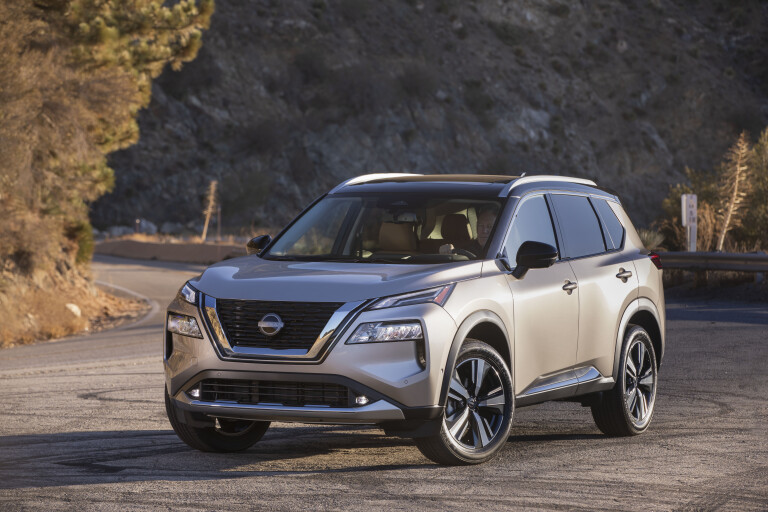
The exterior design is recognisable as a modern evolution of the current X-Trail, although it’s 38mm shorter in length and 5mm lower-slung.
The styling itself tightens up the soft lines of the previous model but may appeal to those who grew up on Transformer films. LED headlights are now standard across the range, with top trims also including LED foglights. Aerodynamic refinements include active grille shutters.
Busy families purchase medium SUVs like X-Trail and, with that in mind, Nissan designed the rear doors to open to 85 degrees wide, which makes installing child seats a snap, let alone installing children into said seats on a daily basis.
This all-new model now permits the unlocking of all doors with the touch of any door handle, as long as you’ve got the intelligent key in your pocket. As any busy parent knows, when you’re arms are full of kiddos, the last thing you want to do is fumble for your keys. The power tailgate is motion activated.
For the time being, there is just one engine and one transmission available, which is an evolution of the existing 2.5-litre naturally aspirated four-cylinder petrol engine. Power is up 8kW to 135kW and, similarly, torque has been increased to 245Nm, a bump of 8Nm over the old engine.
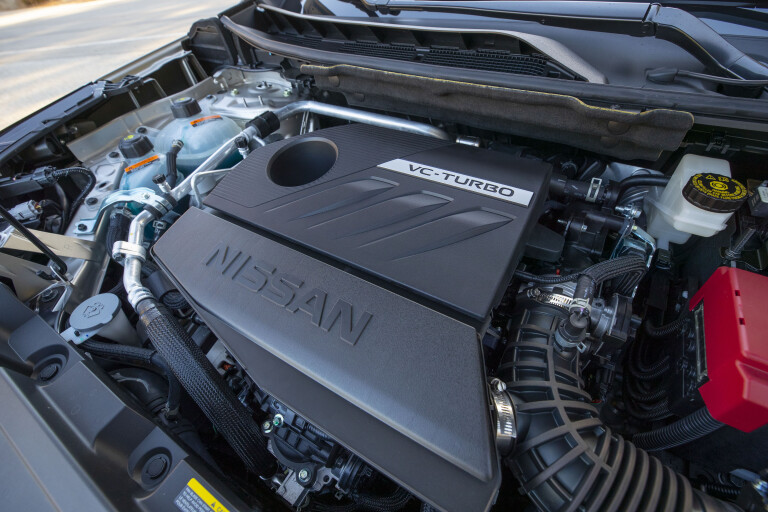
Nissan’s Xtronic automatic continuously variable transmission (CVT) is standard on both front-wheel or all-wheel drive configurations, with paddleshifters for simulated gearchanges.
The all-wheel-drive system uses an electro-hydraulically controlled clutch for torque transfer to the rear axle and this new system is said to be more responsive than that of the outgoing X-Trail.
The front driver includes Eco, Standard, and Sport drive modes, the all-wheel drive X-Trail adding Off-Road and Snow settings.
Nissan makes no mention of manual transmission or diesel engine offerings, however, in some international markets, Nissan has announced its turbocharged, 1.5-litre three-cylinder petrol, which is said to be similarly powerful to the 2.5-litre while promising better fuel consumption.
That engine may facilitate an opportunity to offer manual gearbox availability for customers and markets that demand it.
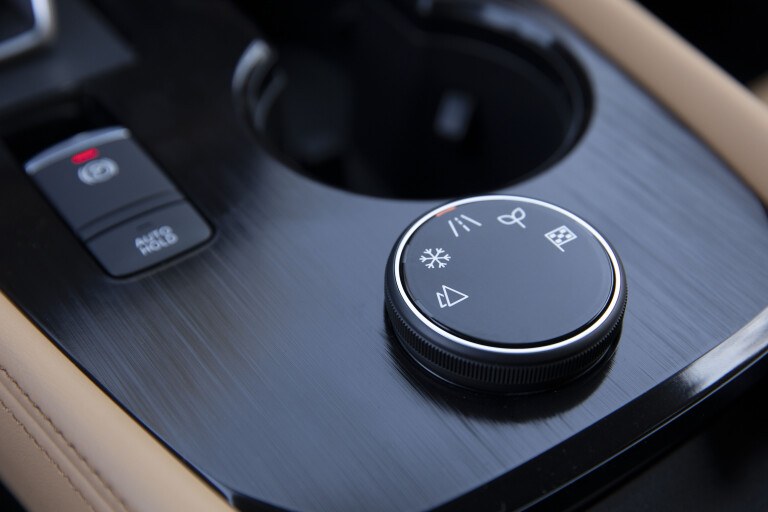
The electrically assisted power steering system uses a rack-mounted assist unit that varies assistance depending on vehicle speed and the steering ratio is slightly quicker than the previous X-Trail. Brakes are four-wheel ventilated discs and the ABS is a four-channel system.
Not straying from the medium SUV norm, the suspension uses MacPherson struts at the front and a multi-link set-up at the rear, with anti-roll bars at both ends.
Like the exterior, the interior receives a comprehensive redesign that brings together modern technology and improved functionality.
Depending on trim level, the driver enjoys a customisable digital instrument panel in either 7.0-inch or 12.3-inch sizes, and a large head-up display is available on top models.
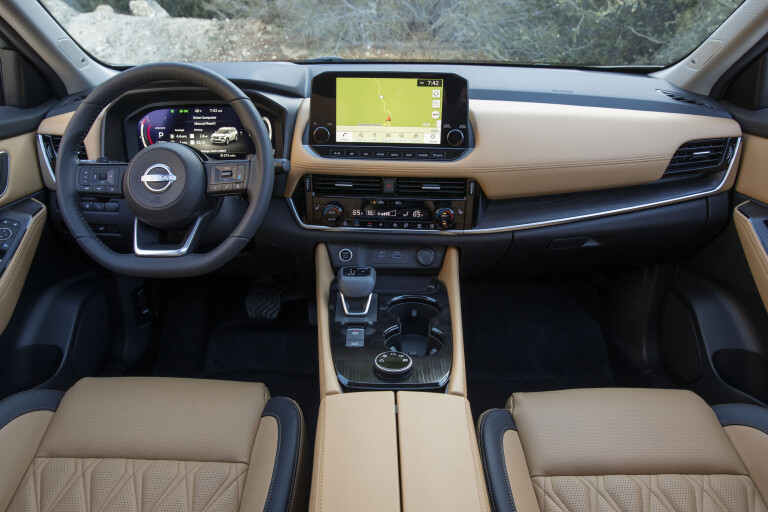
The front row is dominated by the 9.0-inch touchscreen that lives atop the dashboard and is equally accessible for both driver and passenger.
The infotainment system supports Bluetooth, as well as Apple CarPlay and Android Auto, and a wireless phone charger is available on the upper trim levels.
A key update to the interior design is the electronic gear selector, which creates additional storage directly underneath, a boon to buyers who need space for the bits and bobs that go along with their lifestyles.
The armrest uses a butterfly-style lid instead of one that’s rear hinged because, according to Nissan, it provides easier access to small items for passengers in both first and second rows. Both front and rear passengers benefit from Nissan’s NASA-inspired Zero Gravity seats.
The exterior design is recognisable as a modern evolution of the current X-Trail. The styling itself tightens up the soft lines … but may appeal to those who grew up on Transformer films.
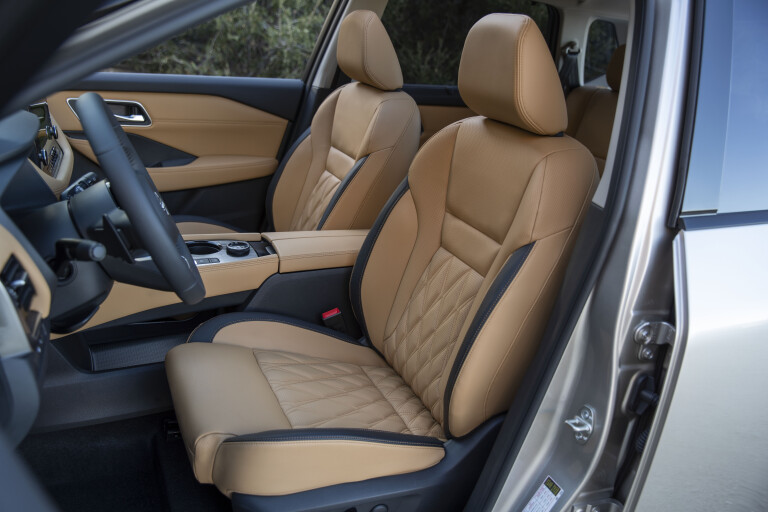
Under the boot floor is flexible storage for your essential gear. Nissan calls it Divide-N-Hide, but what they’ve done is provided a configurable set of dividers that can be used to secure items of various sizes, keep those items out of sight from prying eyes, and among the six different arrangements, can be used to construct a simple set of shelves.
An extensive array of active and passive safety tech is standard on the new X-Trail, including 10 airbags, 360-degree cameras, forward autonomous emergency braking (AEB) with pedestrian detection, rear AEB and cross-traffic alert, blind-spot and lane departure warning, and it will monitor the driver for alertness.
The Nissan ProPilot system available on some variants is a hands-on semi-autonomous system based around sophisticated adaptive cruise control and active lane-keep tech that will perform modest steering and braking inputs while cruising on the open road or in rush-hour traffic.
Nissan says the new X-Trail uses the latest radar and camera technology for smoother vehicle inputs and when the ProPilot system is used. When linked to the native sat-nav, ProPilot will also reduce speeds for motorway off-ramps or when approaching corners. And, with the system’s traffic sign recognition capability, it can actively adjust vehicle speed to match changing speed limits.
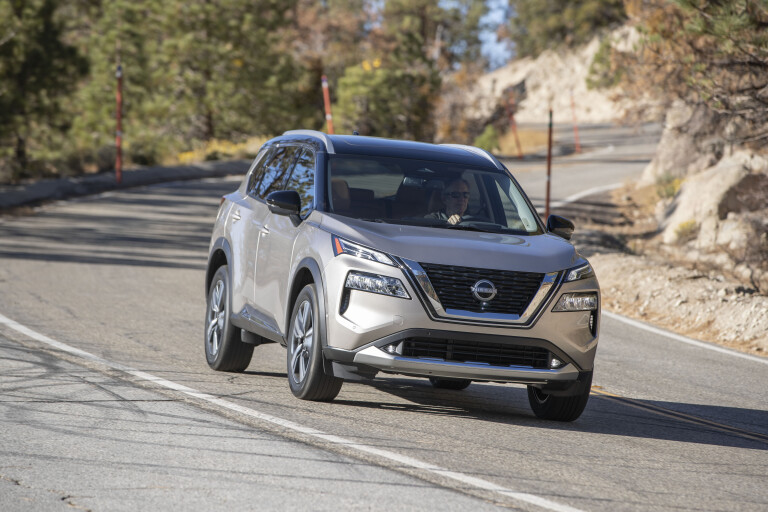
From the taller-than-a-sedan seating position, visibility is excellent in all directions and the driver's seat itself is comfortable and supportive. Although the benefit of the NASA seat foam technology isn’t apparent at first sit, the driver isn’t fatigued after long stints behind the wheel.
Adjustments for the steering column are manual tilt and telescope, which are critical to ensure proper seating positions for a range of driver sizes. The electronic shifter is easy to operate and correctly shifts to Park when the X-Trail is switched off with the start/stop button.
The large digital instrument cluster is impressive for its clarity in most lighting conditions and basic driving information is presented clearly. The head-up display suffers from the same malady as most systems, which is limited visibility if the driver is wearing sunglasses with polarised lenses.
The secondary controls are laid out logically and ergonomically, save for the drive mode selector, which sits in the furthest aft position behind the shifter and cup holders.
The large infotainment screen makes interfacing with the functions a straightforward affair and the system will switch quickly from one mode to another, which suggests Nissan has not skimped on the processor that is conducting the real business behind the scenes.
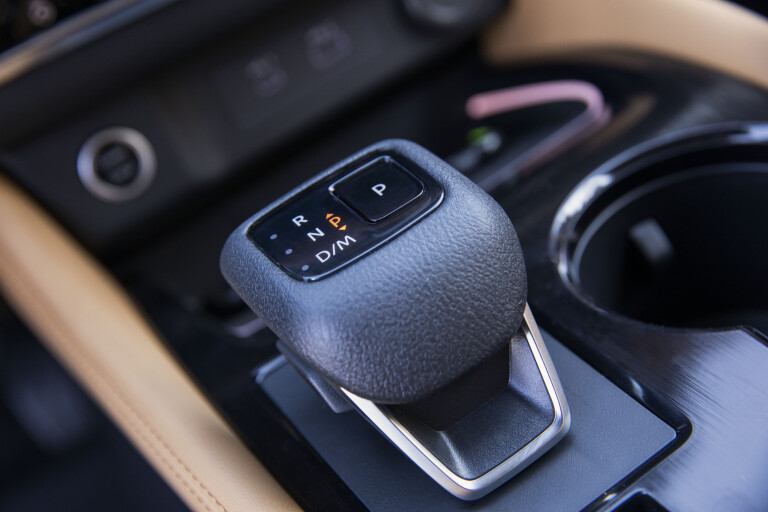
While the X Trail’s climate controls are laid out simply and logically, the system has an unusual way of maintaining temperature while on automatic mode. Instead of holding an absolute temperature, the HVAC’s algorithm seems to favour relative temperature values instead of the number desired by the occupants and feels off by a degree or two.
Even on auto mode, you find yourself regularly adjusting the temperature setting to be comfortable. It’s a three-zone system with one zone for the driver, one for the front passenger, and another for the second row.
With 135kW to motivate 1600kg, acceleration is adequate and the experience is dominated by the sound of the large four-cylinder engine being held at optimum revs by the CVT, particularly at max thrust.
Like other CVT-based drivelines, this one will let the engine run to redline, then drop revs and repeat, mimicking a stepped transmission in those more extreme throttle situations. In normal driving conditions, the drivetrain runs smoothly with the occasional aural intrusion of that large four-cylinder.
Acceleration is adequate and the experience is dominated by sound of Nissan's large four-cylinder engine being held at optimum revs by the CVT.
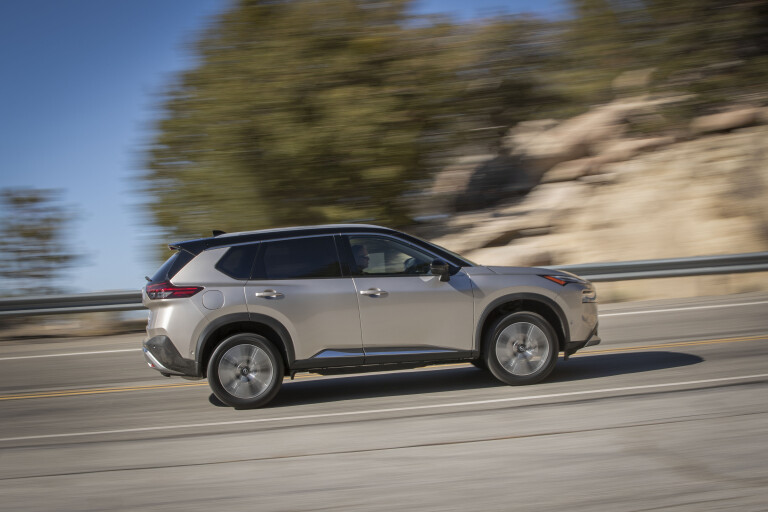
When pushed to extremes, the X-Trail’s all-wheel-drive system does indeed transfer torque to the rear axle quickly, almost imperceptibly, though a further test in low-traction driving conditions is in order.
Suspension tuning is perfectly inoffensive and prioritises passenger comfort over satisfying dynamics. When pushed into corners, the tall Nissan exhibits modest and expected body roll while providing the driver with some chassis feedback.
Body and wheel control is above average, with limited crash through over road imperfections.
The ProPilot system sounds great in theory but in practice, the adaptive cruise control and lane-keep assist systems would benefit from some further refinement. While it is a hands-on system, it lets the X-Trail stray a little too far towards lane markers without driver intervention.
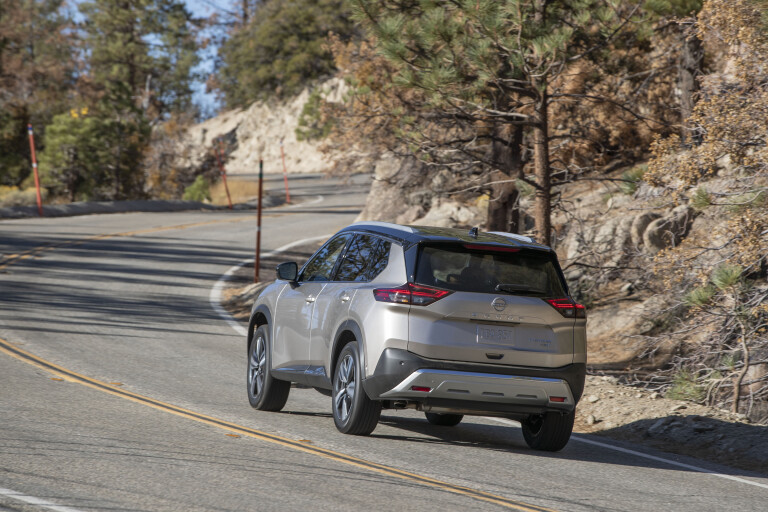
The electric power steering responds directly to driver inputs and the variable-assist lightens up for parking, making quick manoeuvres – like a rushed parallel park in the city – much less of a chore. A sportscar this is not, so don’t expect high-fidelity steering feel or feedback with the X-Trail.
Brakes are your first level of active safety and the Nissan’s four-wheel discs give the driver confidence and control, with good modulation and above average feel. Like most SUVs, expect some dive under moderate to heavy braking, but the system makes driving the X-Trail enjoyable and is one of the highlights.
Suspension tuning is perfectly inoffensive and prioritises comfort over satisfying dynamics; when pushed, the tall Nissan exhibits modest and expected body roll.
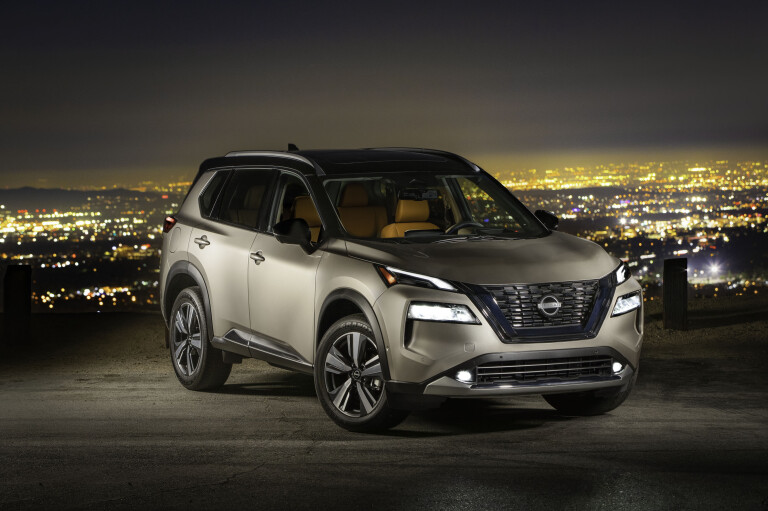
For some, a new generation of X-Trail has been long overdue and Nissan has taken the qualities that buyers have enjoyed to a new level.
With improvements and enhancements across the board, it makes this popular Nissan a more useable SUV for modern families. It’s a solid evolution, not a radical revolution, which is exactly what buyers are looking for.
2022 Nissan X-Trail specifications
| Body | 5-door, 5-seat medium SUV |
|---|---|
| Drive | all-wheel drive |
| Engine | 2488cc I4, DOHC, 16v |
| Gearbox | CVT |
| Power | 135kW @ 6000rpm |
| Torque | 245Nm @ 3800rpm |
| Bore/Stroke | 89 x 100mm |
| Compression ratio | 12.0:1 |
| 0-100km/h | 8.9sec (estimated) |
| Fuel consumption | 8.1L/100km (combined/claimed) |
| Weight | 1608kg |
| Power/weight | 84kW/tonne |
| Front suspension | MacPherson struts, anti-roll bar |
| Rear suspension | Multi-link, anti-roll bar |
| L/W/h | 4648/1840/1689mm |
| Wheelbase | 2706mm |
| Tracks | 1585mm (f); 1590mm (r) |
| Steering | Electrically assisted rack-and-pinion, variable ratio |
| Front brakes | 296mm ventilated discs, single-piston calipers |
| Rear brakes | 292mm ventilated discs, single-piston calipers |
| Tyres | 235/60R18 (f/r) all season |
| Wheels | 18 x 7.5-inch (f/r) |
| Price | TBD |
Things we like
- Interior design
- Flexible storage
- Full suite of safety tech
Not so much
- ProPilot tech needs refinement
- Auto climate control
- Exterior styling

COMMENTS